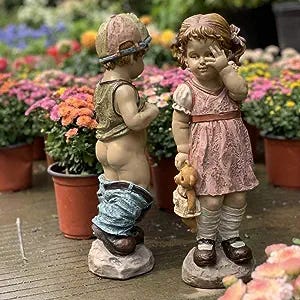SoulSelf
Voices Within
When I was 17 years old, I was arrested for stealing lawn ornaments. But don’t worry. All’s well that ends well. My record was expunged after some community service on the back of a trash truck and restitution.
This is a story that lives in infamy in my family lore. After years of getting made fun of by my siblings, I now have the great honor of being made fun of by my nieces and nephews. The truth is, it’s an important story in my own development. At the time, I was heartbroken, thinking I had forever tarnished my parents’ view of me. I was reminded of this when my mom showed me the letter I wrote to them afterward. As the kids say, it was cringe, but I digress.
That time we were caught was not the first time my friends and I had stolen lawn ornaments. It became a sort of game among my peers because what else was a 16-17 year old to do in St. Louis, Missouri? We thought it harmless because after all, lawn ornaments are pretty ostentatious.
I distinctly remember with each pass at the lawn ornaments of University City, Olivette, and Ladue a growing sense of audacity and verve. The rush of adrenaline was real and it felt like there was a voice inside of me egging me on. All of that was quickly quashed when the police showed up.
I’m happy this story has now become a laughable legend in its own right and truthfully, the repercussions were relatively minor. But that voice I mentioned has been on my mind this week. It was powerful. Our inner self has that capacity for good and bad.
So says the Or Ha’Chaim1 when commenting on 13:7-9, section dealing with the Torah’s strong warnings against idolatry.
כִּ֣י יְסִֽיתְךָ֡ אָחִ֣יךָ בֶן־אִ֠מֶּ֠ךָ אֽוֹ־בִנְךָ֨ אֽוֹ־בִתְּךָ֜ א֣וֹ ׀ אֵ֣שֶׁת חֵיקֶ֗ךָ א֧וֹ רֵֽעֲךָ֛ אֲשֶׁ֥ר כְּנַפְשְׁךָ֖ בַּסֵּ֣תֶר לֵאמֹ֑ר נֵֽלְכָ֗ה וְנַֽעַבְדָה֙ אֱלֹהִ֣ים אֲחֵרִ֔ים אֲשֶׁר֙ לֹ֣א יָדַ֔עְתָּ אַתָּ֖ה וַאֲבֹתֶֽיךָ׃ מֵאֱלֹהֵ֣י הָֽעַמִּ֗ים אֲשֶׁר֙ סְבִיבֹ֣תֵיכֶ֔ם הַקְּרֹבִ֣ים אֵלֶ֔יךָ א֖וֹ הָרְחֹקִ֣ים מִמֶּ֑ךָּ מִקְצֵ֥ה הָאָ֖רֶץ וְעַד־קְצֵ֥ה הָאָֽרֶץ׃ לֹא־תֹאבֶ֣ה ל֔וֹ וְלֹ֥א תִשְׁמַ֖ע אֵלָ֑יו וְלֹא־תָח֤וֹס עֵֽינְךָ֙ עָלָ֔יו וְלֹֽא־תַחְמֹ֥ל וְלֹֽא־תְכַסֶּ֖ה עָלָֽיו׃
If your brother, your own mother’s son, or your son or daughter, or the wife of your bosom, or your closest friend entices you in secret, saying, “Come let us worship other gods”—whom neither you nor your ancestors have experienced —from among the gods of the peoples around you, either near to you or distant, anywhere from one end of the earth to the other:do not assent or give heed to any of them. Show no pity or compassion, and do not cover up the matter.
What, he wonders, does the phrase רֵֽעֲךָ֛ אֲשֶׁ֥ר כְּנַפְשְׁךָ֖, translated here as closest friend actually mean? There are plenty of words for friend or peer in Biblical Hebrew but this phrase which literally means, your friend who is like your soul seems a bit extra.
There is a third dimension to the personality of a person who indulges in sin. By doing so he acquires an additional soul, as it were. Just as we have a principle that she who observes the Sabbath is granted an additional soul (spiritually positive force) on that day, the reverse holds true for the habitual sinner. When you continue on such an evil path, allowing yourself to be enticed into sin, one eventually integrates one's personality with the forces of evil so much so that instead of merely becoming the victim of enticement one denies the essence of Judaism leading one to embrace idolatry.
There is a concept that every Jew is gifted an extra soul on Shabbat to enjoy the enhanced pleasure that exists for that 25 hour period. The Or Ha’Chaim writes that we have also have the potential to add an extra soul, this one full of negative energy, when we become habituated to sin. The more we sin, the stronger it gets until it consumes us to the point where we no longer can claim to be the victim of enticement but rather the enticer.
That was the feeling I had back then with the ornaments. Each successful run left me wanting more. The voice whispered to me. Hey, this is fun. Then it would get stronger. No one is getting hurt. While powerful, it also lacks substance. Once the consequences came, I no longer heard it. Ultimately, I realized there were more powerful grounding forces in life.
This section of the Torah wants to remind us of that. There is a danger in protracted sin. You get accustomed to it until it becomes a part of you. Yet you also have the power to stop it.
Remind yourself of the Divine force in your life. Remind yourself of the people who can guide you on the right path. Of course, remind yourself of רֵֽעֲךָ֛ אֲשֶׁ֥ר כְּנַפְשְׁךָ֖, your soul-self that pushes you toward goodness. Find that voice. Also, the lawn ornaments are never worth it.
Shabbat Shalom and Happy Weekend!
Ḥayyim ben Moshe ibn Attar-18th Century Morocco/Israel

